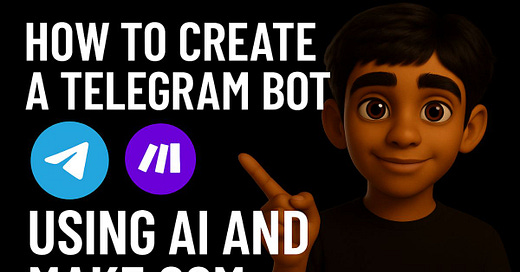To choose Agents or Automations?
Hello All,
Hope you had a great week.
Understanding the difference between AI agents and traditional/AI automations is key to boosting efficiency and ROI.
Here’s a quick guide to help you pick the right tool for your business needs.
1. What Are They?
Traditional Automation: Predictable, linear workflows (e.g., Zapier, Make.com) that execute predefined tasks, like sending invoice reminders. No AI, just reliability.
AI Automation: Similar to traditional, but with AI enhancing steps, like personalizing emails or classifying data within a fixed flow.
AI Agents: Autonomous systems using AI to decide actions and their order, like a chatbot booking meetings by selecting tools dynamically.
2. Key Differences
Traditional/AI Automation:
Pros: Near-zero failure rate, easy to build and maintain, perfect for consistent tasks (e.g., CRM updates, invoice follow-ups).
Cons: Limited flexibility for complex, unpredictable inputs.
AI Agents:
Pros: Flexible, handles varied inputs, great for customer-facing tasks like chatbots.
Cons: Less reliable (1-5% error rate), prone to mistakes like misinterpreting requests.
3. When to Use Each
Choose Traditional/AI Automation for:
Well-defined, repeatable processes (e.g., financial transactions).
High-ROI tasks where reliability is critical.
Simple, clear-cut decisions with minimal change.
Choose AI Agents for:
Customer-facing features like chatbots where a “wow” factor matters.
Low-stakes tasks where occasional errors won’t hurt.
Workflows needing adaptability to unpredictable inputs.
4. Why It Matters
Traditional/AI automations are the backbone of business operations, delivering consistent results
AI agents, while promising, can risk revenue due to errors (e.g., a 5% failure rate could cost thousands). They’re best for experimentation or non-critical tasks until reliability improves.
5. Looking Ahead
AI agents will get more reliable in 1-2 years with tools like Model Context Protocol (MCP).
Future systems may blend traditional automation for critical tasks with AI agents for flexibility.
Build reliable automations now—they can integrate with AI agents later as the tech matures.
Pro Tip: Start simple with tools like Make.com or n8n to automate high-value processes. Experiment with AI agents for low-risk, customer-facing tasks. Focus on measurable ROI, not just flashy demos!
This Week’s AI Tool Tests:
Suno.ai: Generates full songs from text prompts in seconds, with vocals and instruments.
Resemble AI: Creates realistic voiceovers from text or clones voices with permission.
Google Stitch: Turns text or sketches into UI designs for apps. Free via Google Labs, it’s fast for prototyping single screens but limited for complex flows. Ideal for designers needing quick mockups.
Automation Tutorial
AI News this week
Claude Code Secrets that every developer should know.
Imagine coding in your favorite terminal, seamlessly integrating AI-powered assistance into your workflow without switching tools or IDEs.
That’s the promise of Claude Code, a groundbreaking tool from Anthropic that’s redefining how developers write, review, and manage code.
In a recent conversation, Boris Cherny, a key figure behind Claude Code, shared insights into its origins, functionality, and transformative potential.
Full article here - Claude Code secrets that every developer should know
GitHub CEO on the future of coding and AI
In an era where AI can write code, is learning to program still relevant? The CEO emphatically says yes, arguing that coding is as fundamental as math or physics for understanding the modern world.
“Software is everywhere… our car today is mostly defined by software and maybe a battery if you have an electric car.
Full article here
See you next week,
Adi
If you need a basic session or want me to create an automation on n8n (and have a budget), have some suggestions- mail us at: learninwithak@gmail.com




